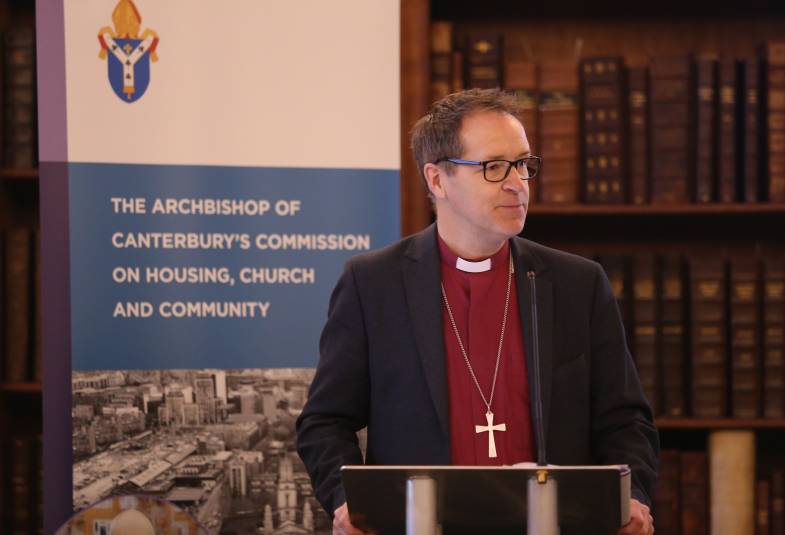28/10/2019
This blog is written by a member of the independent Commission. These views do not necessarily represent the views of the Archbishops' or the Church of England.

It was a seismic event at the time, and the impact was felt around the world. There was incredulity that such a thing could happen in one of the world’s most sophisticated cities. Something drastic had gone wrong, and it seemed at the time that finally, urgent issues would be addressed and change come about.
I spent a day recently, introducing fellow members of the Archbishop of Canterbury’s Commission on Housing, Church & Community to some of the people I’ve come to know in North Kensington over the past two years. Listening again to the stories of people who were caught up in the fire and its aftermath, I came away with the depressing feeling that, two years on, not much has changed and little has been learnt.
Grenfell United have become well known as the main group representing survivors and bereaved families. Those who came together to form this group are ordinary people, none of them paid, all of them are trying to hold down regular jobs, support families or pass exams. Yet their experience as survivors of the fire or relatives of those who died has given them a heavy burden to bear - a realisation of the need for urgent change to our approach to housing and a sense of debt to those who died that what happened at Grenfell never happens again. Residential blocks around the UK are still covered in Grenfell-type cladding. Yet we have been slow to solve the problem (the state of Victoria in Australia has spent as much on removing cladding than we have as an entire nation). Tenants in social housing are still ignored when they complain about shoddy service, and there is still little effective regulation of bad landlords. GU have limited resources, yet a huge determination to keep the pressure up on these issues, urging a change to the way social housing is thought of in the UK.
We sat with one young mother of three, in her small flat in one of the blocks near the shell of Grenfell Tower. She lives in what is euphemistically called ‘temporary accommodation’ (some in her block had been in such a state for twenty years or more). The block had been without hot water for many weeks. When it was finally fixed, within a week she was then told to move her family to another flat in the block as the owners wanted it back. If she refused, the only options were a flat in Essex miles away from her children’s schools or homelessness. The lock on the door to the ground floor balcony did not work, making the apartment vulnerable to intruders. Doors were hanging loose from kitchen cabinets making them unusable, and mouse droppings were scattered across the floor despite her putting down traps. Because the flat was offered by the Council yet administered by a Housing Association, it was hard to know who to complain to. As a result, repeated calls to the landlord had yielded little change. Talking to tenants in the block, the repeated claim was that they would say ‘we will get back to you’ and never did. Similar stories are found all over north Kensington, people reluctant to complain in case they are branded troublemakers, echoing the story of Chloe Williams, who faced eviction from her one bedroom council flat in Kensington after complaining about rats, mice, cockroaches and bedbugs in her home.
All this is happening in one of the wealthiest boroughs of the country. Many feel our drastically reduced social housing stock has become in the words of one resident a ‘dumping ground of the most vulnerable in our society’. It comes so low down on our list of priorities, that the people who live in it, including many of the most vulnerable, feel abandoned. If a society can be judged on how it treats it poorest and most defenceless people, we are not doing well. The people we met repeatedly feel fobbed off, uncared for, and that the very people who are responsible for their housing don’t seem to care enough to pick up the phone or arrange repairs.
Which brings us back to Grenfell United. The kinds of change GU have been campaigning for – stronger regulation and a change of culture around health & safety standards (including the removal of unsafe cladding) and a proper tenant voice – should not be hard to establish. The financial crash led to tighter regulation of financial institutions so that if a bank mis-sells there are clear penalties. If a school is not run properly there is an inspection system to label it as ‘needs improvement’. Yet tenants with landlords who fail to maintain their property, rendering it unsafe, have no effective remedy, other than repeated attempts to get landlords to listen. And that didn’t stop Grenfell happening.
Two years on since Grenfell, nothing much has changed. There are even stories of Council officials saying that Grenfell is in the past, and it’s time to move on. It’s not hard to imagine how that feels to those who lost loved ones in the Tower, especially when they feel nothing has been learnt. If we continue to neglect social housing in this way, there is no guarantee Grenfell won’t happen again somewhere else, sometime soon. If it does, we will have no excuses left.
The Bishop of Kensington, Dr Graham Tomlin
A shorter version of this article appeared in the London Evening Standard on Friday 25th October.